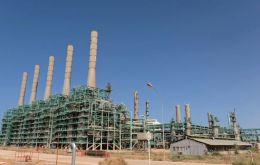MercoPress. South Atlantic News Agency
Tag: OPEC
-
Thursday, October 14th 2021 - 14:58 UTC
Putin anticipates the price of crude could reach US$ 100 a barrel

The price of crude could rise to US$ 100 per barrel in coming weeks, anticipated Russian president Vladimir Putin during the Energy Week conference held in Moscow.
-
Sunday, October 10th 2021 - 19:41 UTC
US will not release strategic reserve and Brent oil climbs to US$ 83 the barrel

By Julianne Geiger for Oilprice.com - The Unite States Department of Energy is walking back previous comments that it was considering a release of the Strategic Petroleum Reserve and a ban on crude oil exports, Bloomberg’s Javier Blas reported on Twitter.
-
Thursday, September 2nd 2021 - 09:32 UTC
OPEC and Russia keep steady on original plan; ignore US request to pump more oil

The Organization of Petroleum Exporting Countries plus a group led by Russia, OPEC+1 ignored requests from United States president Joe Biden and agreed on Wednesday to continue raising oil output in measured steps as originally agreed.
-
Monday, July 19th 2021 - 09:11 UTC
OPEC and Russia+10 will increase output, 400,00 bpd, as of August first

The world's leading oil-producing countries agreed on Sunday to continue with the gradual increase of output, 400,000 barrels per day, beginning August first, to help global economic recovery following the pandemic, according to a release from the group's meeting in Vienna.
-
Tuesday, March 9th 2021 - 09:51 UTC
Oil heading for US$ 70 a barrel on OPEC+ latest decision to retain output cuts

Oil is heading toward US$ 70 a barrel after OPEC+ chose not to relax supply curbs even as the global economy pulls out of its pandemic-driven slump, confounding widespread expectations the group would loosen the taps.
-
Monday, January 4th 2021 - 04:55 UTC
Opec meeting via videoconference to decide on February production level

Members of the Opec group of oil producers and their partners will meet via videoconference next Monday to decide on production levels for February, hoping to turn the corner on a difficult year. The Opec+ ministerial meeting comes after oil consumption tanked in 2020 due to the Covid-19 pandemic and a price war between Saudi Arabia and Russia.
-
Tuesday, December 1st 2020 - 08:44 UTC
OPEC and allies postpone talks amid disagreements on how much oil to pump

OPEC and allies led by Russia postponed talks on oil output policy for 2021 to Thursday, sources said on Monday as key players still disagreed on how much oil they should pump amid weak demand due to the coronavirus pandemic.
-
Monday, September 28th 2020 - 09:05 UTC
OPEC is sixty, and feels old, exhausted and in need of more partners

OPEC faces a critical moment in its 60-year history with the coronavirus crushing crude demand and prices, discord among its members, and threats from a world seeking cleaner fuels.
-
Monday, September 28th 2020 - 08:30 UTC
Libya's Hariga port resumes loading export oil after an eight month blockade

An oil tanker is expected to load crude at Libya's Marsa el-Hariga terminal this week, the first since a blockade by eastern forces in January slashed the OPEC member's oil production to a trickle.
-
Thursday, August 20th 2020 - 10:05 UTC
Oil industry's recovery is incomplete but sustainable

Throughout the summer, oil’s recovery from its devastating crash has looked somewhat dubious. While the price of crude rebounded somewhat, it did not wholly regain its pre-pandemic strength. And while the nations of OPEC+ put measures in place to cut production and close the gap between supply and demand, certain nations involved hinted at the reluctance to keep cuts in place. These factors, coupled with the lingering potential of fresh “waves” of the coronavirus, have kept us from being overly optimistic about the state of oil.
